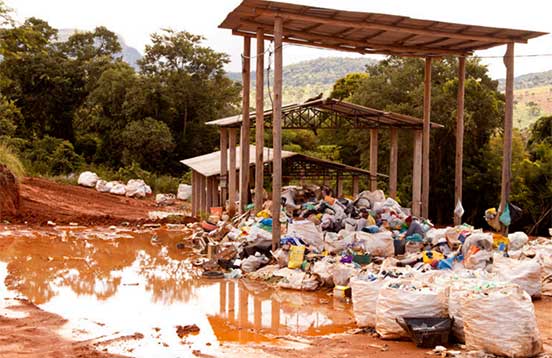-
New study from WIEGO shows 90% of waste pickers surveyed across Brazil have experienced climate-change-related extreme weather events
-
Public Ministry of Minas Gerais signs commitment to build climate resilience for waste pickers
-
WIEGO urges Minas Gerais government and private sector to strengthen dialogue with waste picker cooperatives
Minas Gerais, November 7th: Brazilian waste pickers have this morning secured commitment from the state government and the Belo Horizonte Municipal Waste and Citizenship Forum (FMLC) that they would take action to build climate resilience.
The Public Ministry of Minas Gerais and the Belo Horizonte FMLC signed the letters of commitment alongside the National Movement of Waste Pickers of Brazil and WIEGO, in light of increasing climate-change-driven extreme weather events.
Their commitments include documenting the impact of extreme weather events on waste pickers, environmental education to raise awareness among the general public, measuring positive environmental impact of waste pickers’ work (via a tool that measures the amount of greenhouse gas they mitigate through their recycling work), and to uphold public waste management policies that guarantee the participation of waste pickers in the waste management sector.
The State Prosecutor and Coordinator of the Coordination Centre on Inclusion and Social Mobilization for the Public Ministry of Minas Gerais, Paulo Cesar Vicente de Lima, said the commitments follow learnings revealed in WIEGO’s research ‘Impacts of Climate Change and Adaptation Strategies: Experiences of Collectors in Brazil’.
“The study produced by WIEGO helps public authorities to understand the current challenges faced by waste pickers and awakens us to contemporary issues, such as the relationship between this sector and climate change”, he said.
"The quest to guarantee the fundamental rights of waste pickers is part of the institutional planning of the MG State Prosecutor's Office and is one of the central axes of action of the Social Inclusion and Mobilization Coordination."
The commitments were part of a policy dialogue co-organized by WIEGO in partnership with the Belo Horizonte Municipality, the National Movement of Waste Pickers and the State Prosecutor's Office of Minas Gerais held in Belo Horizonte’s City Hall Auditorium. During the dialogue, WIEGO presented its research, showing that more than 90% of waste pickers surveyed across Brazil have experienced climate change-related extreme weather events in the last year. Many reported that the events had negatively impacted their health, earnings or ability to work.
Extreme weather impacts waste pickers’ health and earnings
Climate-Change Impacts and Adaptation Strategies: Waste Pickers’ Experiences from Brazil sets out to understand how climate change was impacting workers’ earnings, work and the strategies they used to cope and adapt. Close to 100 workers based in Manaus, Amazonas; Salvador, Bahia; and Belo Horizonte, Minas Gerais were interviewed for the study.
Sonia Dias, the lead researcher, says with climate change accelerating faster than predicted, understanding its impact on this workforce is vital.
“Across the cities, we noted that extreme weather events affect waste pickers: Some experienced dehydration, heatstroke, fatigue and exposure to pathogenic organisms due to extreme heat. Many others said extreme weather can degrade their workplace infrastructure, damage their recyclable materials, and limit their ability to work altogether,” said Dias.
“Waste pickers help reduce pollution and carbon emissions in Brazilian cities. They keep our cities clean and play a vital role in mitigating climate change so it’s only right that we support them in confronting the impacts of extreme weather.”
Dias celebrated the commitment of the Minas Gerais government and the Belo Horizonte FMLC to engage with and support waste pickers in building resilience to combat climate change. She forefronted the importance of these types of collaborations across disciplines: “We need cross-sector collaborations and for city governments to invest in climate change sensitive infrastructure for workspaces so that waste pickers can maximise the incredible work they already do as environmental agents.”
Waste pickers - who collect, sort, recycle and sell recyclable materials - are responsible for gathering close to 60% of all plastic material that is recycled worldwide. In Brazil, over a quarter of a million people collect and sell recyclables for a living — a number that has generally increased in the last decade or so.
For further information or interviews, please contact:
Nicole Pryor on nicole.pryor@wiego.org, Graciela Mora on graciela.mora@wiego.org or Kendra Hughes on kendra.hughes@wiego.org (EST).
Editor’s notes
About WIEGO
Women in Informal Employment: Globalizing and Organizing (WIEGO) is a global network focused on empowering the working poor, especially women, in the informal economy to secure their livelihoods. We believe all workers should have equal economic opportunities, rights, protection and voice. WIEGO promotes change by improving statistics and expanding knowledge on the informal economy, building networks and capacity among informal worker organizations and, jointly with the networks and organizations, influencing local, national and international policies. Visit www.wiego.org.
Worker quotes
Suellen Cardoso Ramos, Waste Picker, National Movement of Waste Pickers of Brazil (Movimento Nacional dos Catadores de Materiais Recicláveis of Brazil), Manaus City
“Climate change is having a direct impact on the logistics of transporting the waste that comes from the municipalities to Manaus, because we're in a period of drought and with everything that's been happening we have the issue of fires that directly affect the air we breathe. Manaus has been suffering from a wave of smoke that is having a direct impact on our health. Climate change is directly affecting the health, work and income of waste pickers.”
